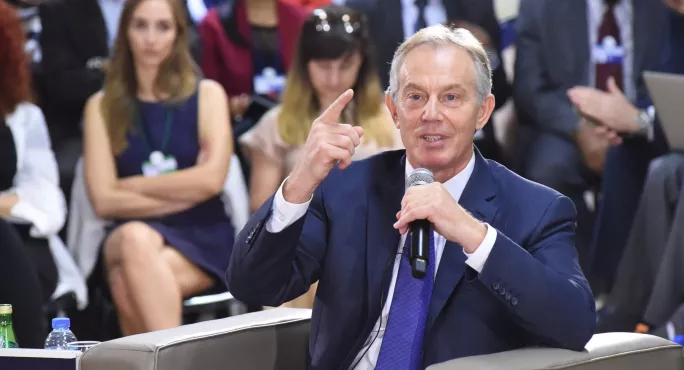- Home
- Tony Blair: Educational performance determines a country’s success or failure
Tony Blair: Educational performance determines a country’s success or failure

Education is the biggest determinant of whether a country succeeds or fails, former Prime Minister Tony Blair has said.
Speaking at the Global Education and Skills Forum in Dubai, Mr Blair said countries around the world were now placing a greater emphasis than in the past on the quality of their education systems.
“I think today people understand it [education] is probably the biggest determinant going forward of whether a country succeeds or fails,” he said.
“So I think the importance is much greater today, and we also want to look at the quality of education and not just [the] numbers in the door.
“You can achieve what look to be very impressive figures of the number of children enrolling in education but unless what they’re being taught is really equipping them for the modern world then it’s not such a great thing.”
Mr Blair also urged governments to make sure teachers were well-paid and had a high status, and said ministers should be “valuing, investing [in] and supporting” education systems that made teachers feel they could “really fulfil their mission and vocation to teach”.
Teachers should work in an “environment in which they’re allowed to develop and to prosper and feel they’re really making a difference to their children,” he said.
He also urged schools and governments to focus on the quality of school leadership.
“I’ve come across bad schools with good leaders, but they’re very, very rare,” he said. “I’ve never come across a good school with a bad leader, so getting the right leadership into your schools is really important.”
Mr Blair told the conference that during his time in power, reforming the education system was “hell” and was “probably one of the most difficult things you do in government”.
“You have major interests that often stand in the way of it,” he said.
“My experience of reform is that everybody is in favour of reform in general, it’s just that in particular, they’re usually not, especially when the reform comes to them.
“The basic rhythm that I understood at the end of my time in government, and I wish I’d understood at the beginning, is that particularly with education reform, when you first propose it people tell you it’s a terrible thing.
“When you’re doing it, it’s hell, and after you’ve done it, you wish you’d done more of it.”
Mr Blair voiced support for profit-making schools, particularly in developing countries, arguing that the private sector was often more innovative than the public sector and can “test and see what’s possible”.
“I think you need to experiment with different types of provision and provider and this is where the partnerships with the private sector come in,” he said.
Asked whether it was acceptable to make money out of education, he said: “Provided you’re educating the kids well. The single most important thing is that they get a decent education.
“In our state system in the UK we don’t have a for-profit part to it. But I personally think if you’re starting now, particularly if you’re in a developing country, and someone can come in and run schools effectively or individual schools.
“This is just my experience in government that the benefit of the public sector is that it helps those who need help. The problem is that it’s not good at innovating and I think if you have a range of providers, it allows you to see what might be possible and it allows people to adapt and adjust.”
He avoided making comments when asked about the Labour leader Jeremy Corbyn, saying that if he did so it could be a distraction from his thoughts on education. But he said there was now a “populism” in politics, on the left and the right, and added: “When I look at politics today, I am not terribly sure that I quite understand it.”
Keep reading for just £1 per month
You've reached your limit of free articles this month. Subscribe for £1 per month for three months and get:
- Unlimited access to all Tes magazine content
- Exclusive subscriber-only stories
- Award-winning email newsletters



